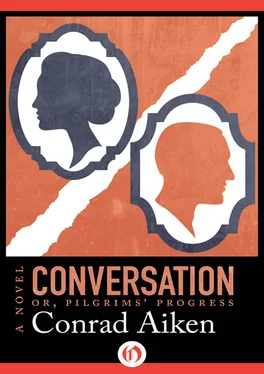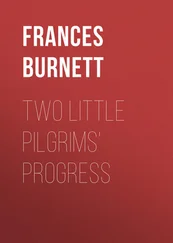“Well, that’s very nice of you, kid. And of course it goes without saying that I’ll miss not seeing you, and all our good philosophical talks. That’s one of the main reasons I came here, as you know, and it won’t be the same thing without you — yes, I’m sorry about that. And I see how you’re fixed — you can’t do anything if Enid feels like that about it. I wouldn’t expect you to, and I don’t want to be the cause of trouble between you — I like you both much too much for that, you know that, Tip. And the same way, I can honor Enid’s principles about all this, even if I can’t agree with them. I like Enid, she’s honest, and she isn’t afraid of sticking to her guns. She’s a damned fine girl. But no, I’m afraid, kid, I couldn’t do that, I couldn’t promise to do that.”
“Yeah. Maybe Mister Upright Kane will try to realize that it isn’t only the upright Bostonians and upright snobs that have upright principles—”
“Well, yes, that’s it. It’s a matter of principle with me. It’s what I believe, see, kid? And you wouldn’t really expect me to give that up, any more than I would expect Enid to, would you?”
“ Why can’t you — oh, gard, oh, gard — why don’t you have some sense for once, and let us have a little peace here, instead of just sitting round waiting for the police to come. And it won’t be only you they’ll come for, either, it’ll be you too, Karl. It’ll be all of us — they’ll arrest us all. Oh, gard, what’s the use—”
“Will you shut your damned fool wailing, weakwit? You wouldn’t know a principle if it hit you in the face.”
“As if you had any principles! As if you were doing anything but sponge! As if you were doing anything—”
“Shut up!”
“Yes, by god, Karl, I’m damned if I don’t think Kitty’s right! I don’t believe you give a hoot in hell for Jim’s principles, or care a damn what happens to him — so long as you get your share of the money. That’s what makes me feel really sick about all this business, Jim. I don’t think Karl or this Bucholtz, for instance, really believe in you for a minute — oh, I know, they think it’s all very amusing and original, it makes a good story, doesn’t it? It’s nice and spectacular, and they can share in the glory — from a safe distance! But they’ll use you for their own selfish ends, and then sacrifice you when the time comes. Look at that cheapskate riding all the way up here in a taxi at your expense — he’ll be the first to run out on you when the trouble starts—”
“Yeah? And would he be the first to take a run-out powder round here? You make me sick.”
“No, kid, I don’t believe that.”
“Oh, of course not, you’re too holy to believe anything like that, aren’t you, you and your Messiah idea—”
“Who said anything about a Messiah idea, Kitty?”
“Oh, no, you never posed as a Messiah, did you? — you never thought you were another Christ, did you? — why, he’s crazy, that’s what he is, and anybody can see it — he’s crazy as a bedbug, he ought to be in a hospital, even Lorna admits that, she feels the same way I do about it—”
Suddenly she began wailing again — grotesquely, tragically, as if in an absurd kind of accompaniment to the badly played jazz from the next room, that glucose rhapsody — but as abruptly she stopped again, pressed a stained handkerchief hard against her mouth, and began feverishly writing once more on the sheet of paper which lay before her on the disordered table. Tears were running down her cheeks, she was audibly sniffling, she was obviously on the verge of hysterics — and it was as if this sudden manifestation of the depth of her misery had brought them all up short, they were all silent, they all watched her and were silent. A needled flight of rain, swift and light, a gust of blown drizzle, pattered across the windows of the long room, stinging and darkening them; the fire smoked; Lorna interrupted her playing to cough once more, and then resumed stolidly, stubbornly, almost as if angrily; the putt — putt — putt of a motorboat stuttered from the river, a detached and ironic reminder of the sea, of the outer world — but they were all silent, as if somehow bewitched by Kitty’s unhappiness, and as if it had mysteriously emptied them of all power to act or speak. What more was there to do? What more was there to say? It was time alone that remained, and as they listened to the hectic scribbling of the pencil, moving rapidly on the paper, by a tacit agreement they avoided each other’s eyes. Was it shame? Embarrassment? Despair? Jim, moving very carefully, very slowly, leaned over to strike a match on the tiles at his feet, drew it crackling and spurting towards him, to relight the blackened stump of his cigar. Karl lay sideways on the wicker couch, the blue eyes looking at nothing, the thin mouth fixed in a defensive half-smile, the soiled raincoat drawn over his knees. And in that stillness the disorderly room, with its unswept floor, the piled dishes, the tumblers, the gin bottle, the dead matches and lipsticked cigarettes, looked inconceivably forlorn. How could they ever be happy here? How could anybody possibly be happy here? Newspapers — a rocking chair, with one rocker broken, shoved out of the way against the corner wall under the stairs — the one sardine, too, in the kitchen — and Lorna, in “that damned dressing gown,” playing the piano tirelessly, badly, as if nothing else in the world existed — no, they could never be happy here. But would they, in fact, be here much longer? For the little Utopia was already broken, and even now above it hovered the invisible wings of departure. The mistake was coming to an end.
“Well, I guess there’s not much else to say, Jim.”
“No, I guess there’s not much else to say.”
“Except to say that I’m sorry, again.”
“Yes, Mister Kane, you said that before. I suppose you plan to leave the rest to your friend Mister George Pierce?”
“I don’t think you need to worry about Mister George Pierce.”
“Yeah? I thought he was threatening to notify the police?”
“You don’t know the police here, Karl. The police consists of Uncle Cy William, who boasts that he never made an arrest in his life. It’s a fact. Once they heard him yelling late at night to some thieves he’d been set on, ‘Run, boys, run, or Uncle Cy William will get you!’ No, his only vice is cutting off the heads of dogs.”
“ What , kid?”
“Yes, one of his jobs is to see that all dogs are licensed. Dog licenses cost two bucks, and the money goes to the town library for books — it’s the library’s only support. They say, if he finds an unlicensed dog, he takes it out to the woods and chops its head off with an axe. But I don’t know. Besides, I feel pretty sure George Pierce was only bluffing. You don’t need to worry.”
“Thanks for them few kind words. And here’s your hat, what’s your hurry? But don’t try to reach for that one, it’s over your head.”
“Very clever of you, Karl. Your magnanimity overwhelms me.”
“Keep the change.”
“And if I might be allowed one personal observation—”
“Oh, sure. And why not?”
“It seems to me, in a matter that’s after all none of your business, that you’re behaving damned badly.”
“Yeah?”
“Yeah. I’ve got nothing but respect for Jim. I’ve got none at all, I’m afraid, for you.”
“Thanks. I appreciate that. Coming from you—”
“Don’t pay any attention to him, kid. Just let him sulk. He’ll get over it.”
“Okay. Well, I guess I’ll be going.”
He got up and went to the table to shake hands with Kitty, but she sat with lowered head, as if blind, desperately absorbed in her writing, and he merely patted her shoulder instead. Even as he touched the stooped shoulder she continued to write — and looking down he saw at last what it was. The torn piece of paper was almost entirely covered with the words Jesus Christ . And while he watched, fascinated, the hurrying hysterical pencil added yet others— Jesus Christ, Jesus Christ, Jesus Christ, Jesus Christ … It was her final comment on the Utopia.
Читать дальше












